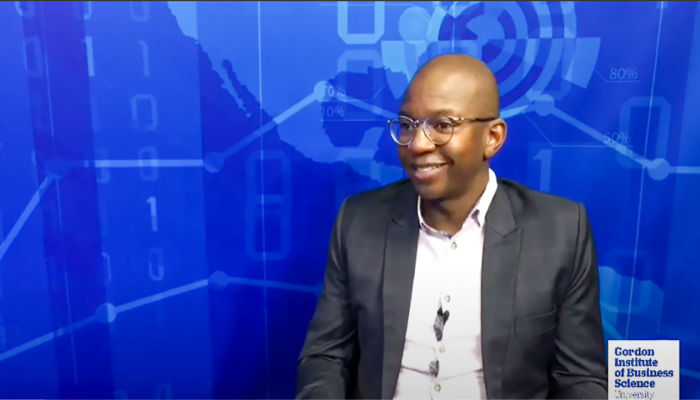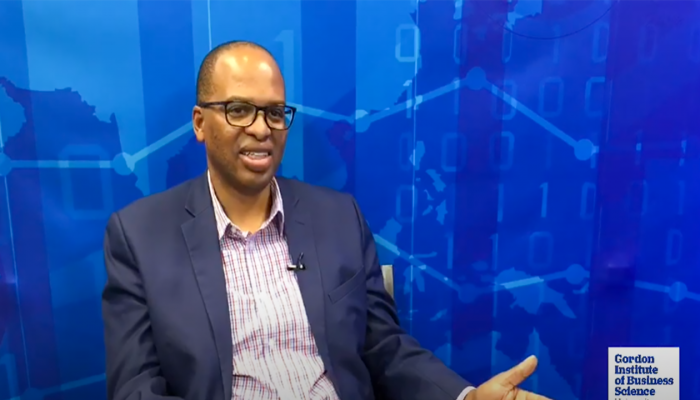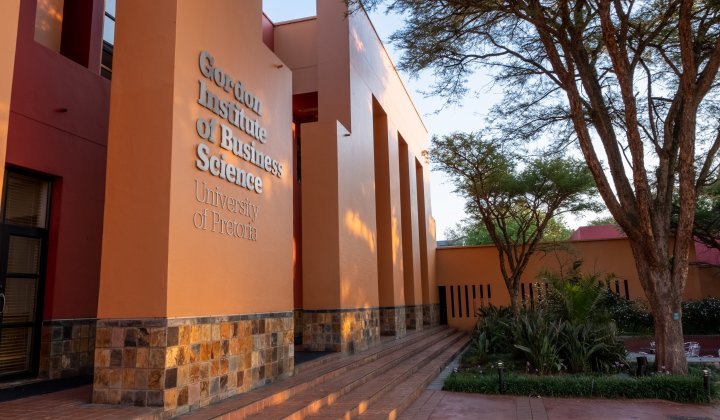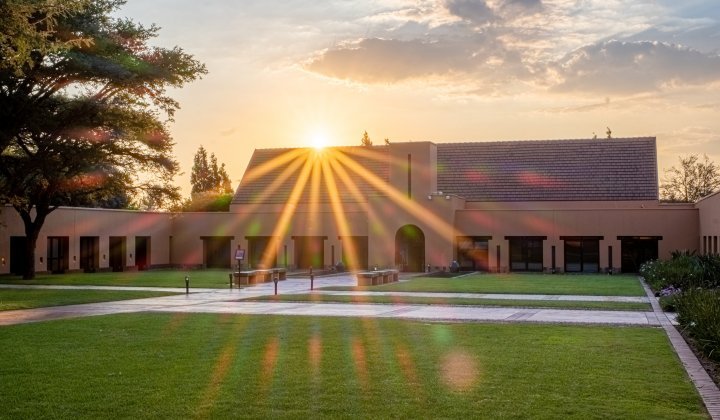Interim dean of GIBS, Dr. Morris Mthombeni, sat down at a recent GIBS Flash Forum with the CEO of GE southern Africa, Nyimpini Mabunda, a year into his new role and discussed GE’s response to the pandemic, as well as the company’s regional strategy.
Appointed to lead the multinational’s operations in southern Africa two months into the emergence of Covid-19, Mabunda hit the ground running and took the uncertainties that came with the pandemic in his stride. In the first few months of the pandemic, there was a critical shortage of personal protective equipment (PPE) and ventilators worldwide. Ventilators are life-saving medical devices used in the final attempt to treat Covid-19 patients with severe acute respiratory distress. Most of the world’s PPE and ventilators were manufactured and imported from China.
South Africa had to make contingency plans to deal with the moving target that was Covid-19. Local innovative solutions for the manufacture of PPE and ventilators were needed to respond rapidly to the virus.
“Everybody knows that there was a worldwide shortage of ventilators in the pandemic, and we had to be creative and localise and work with what we had to fight the pandemic. We are in the business of saving lives […]. We are involved in the fight against the Covid-19 pandemic because we make ventilators, we make patient monitors [and] we make imaging equipment,” said Mabunda.
The local GE team used its expertise in collaboration with South African state-owned aerospace and military technology conglomerate, Denel, in the local manufacture of PPE and ventilators. Denel had the technology and some manufacturing capabilities and was already producing related products, said Mabunda, which made for an ideal partnership with GE in the fight against Covid-19.
GE’s global response to the pandemic
GE has a footprint that extends beyond the US into Europe, Asia, the Americas, and the Middle East and Africa. The multinational ensured its four business divisions – aviation, healthcare, power and renewable energy – aligned with its Covid-19 response efforts.
The healthcare division is composed of healthcare systems, pharmaceutical diagnostics and BioPharma. In its 2020 annual report, GE said it had quadrupled its ventilator production and increased the output of critical medical equipment for the diagnosis and treatment of Covid-19.
Some of the healthcare responses during the pandemic included x-ray, anaesthesia, and point-of-care ultrasound products, as well as the launch of digital solutions that assist with virtual healthcare delivery to patients, added the report.
The group says that its aviation division produced and serviced engines and components for military and cargo aircraft that made daily trips worldwide, assisting Covid-19 response efforts.
The power and renewable energy divisions supported electricity generation for critical hospitals and healthcare facilities, including homes and businesses.
Opening local markets
Posing a question on behalf of an audience member who raised concerns about multinationals in the region barely developing local industries in which they operate, Mthombeni asked Mabunda how GE supported skills development and manufacturing capabilities on the continent.
“We could not have been in South Africa for over 120 years and not localised,” responded Mabunda. Part of that localisation includes enterprise development. “There are many, many enterprises, particularly in the energy space, that have been created and grown through the GE supply base,” he said, adding that GE was always looking for opportunities to localise sustainable markets, but this required a good customer base, efficiency, and scale.
“There have been mistakes, and we engage all the time with the Department of Trade and Industry around the Industrial Development Zones and the incentives. [A case in point is] when you talk about black industrialists where factories have been built in a big hurry, and they've really become obsolete because there hasn't been sustainable demand,” he noted.
Mabunda said the Africa Continental Free Trade Area that became effective in January 2021 was encouraging in that it would likely raise more opportunities to further localise and scale the market on the continent.
“If there is a tariff-enabling environment for trade within Africa, the proximity, for example, in my region in southern Africa where you could set-up local manufacturing facilities in South Africa and then transport by road into neighbouring countries, then it starts to make sense because then it's not just South Africa that is doing energy transition, it's all of the markets,” he said.
Driving Black Economic Empowerment (BEE)
GE has been involved in huge projects that include the construction of Eskom’s Kusile and Medupi power stations and the manufacture of locomotives for the Gibela Rail Transport Consortium for South Africa’s integrated freight transport company, Transnet.
The South African government requires GE to build local industries by localising 30-40% of its ventures, something Mabunda said the conglomerate had embraced. He emphasised that the company currently had three business entities in South Africa, each with a 25% shareholding. He added that each of the local GE entities holds a level one, level two and level four BEE status, respectively.
“We’re not just doing it for BEE and government’s sake,” he said, “We're doing it for sustainability because we're an industrial business. A lot of our equipment has got a 20-year plus shelf-life, or life. So, you need to have local people who are trained to maintain and service the equipment. That's what you do with sustainability,” said Mabunda.
Leadership during the pandemic
Mabunda said the pandemic taught many leaders – himself included – to unlearn and challenge previously held hard beliefs and conventional ways of doing business. “I've learned to be more patient. I am the kind of person that wants things to happen. And the team knows…[it’s] survival of the fittest – pace is important in delivery. And I like to break records in how we execute,” he added.
But the uncertainties that came with the pandemic also taught him to be more tolerant of mistakes and appreciate that not everything will work as intended and that attaining the desired results would require some flexibility on his part as a leader.
“And I think, lastly, what I really have appreciated and learned is that we undermine the potential of our people and the power of solutions that lie in them. And I've seen […] many stars emerging through this period, and you think, ‘I didn't think you could do that’. I really think we are conservative with talent. People have the capacity to do a lot more when we trust them with responsibility.”







